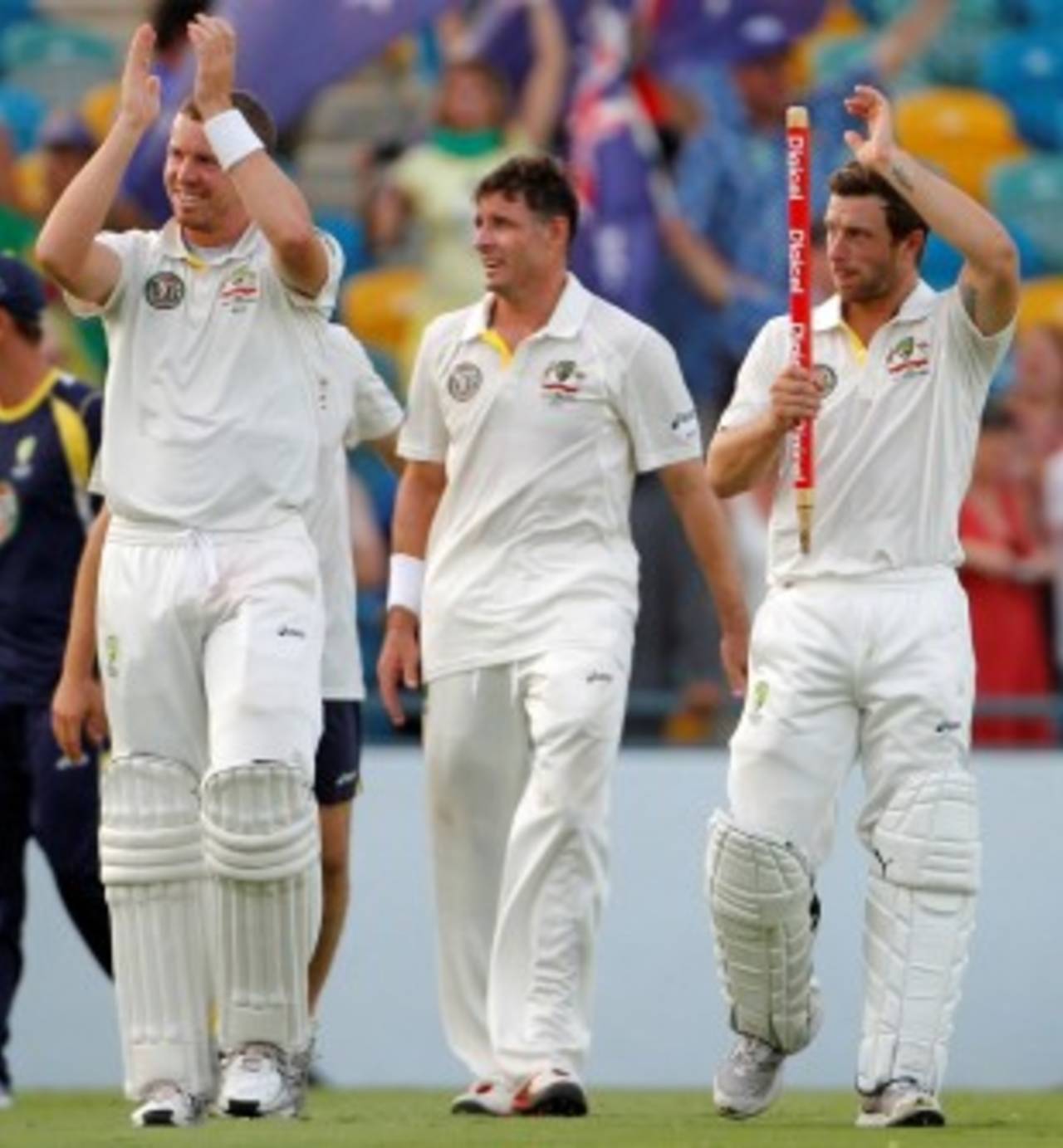In the Kensington Oval gloaming, familiar to all who had been here for the unhappy conclusion to the 2007 World Cup final, Australia's cricketers gave themselves a far more edifying memory of victory in Barbados. In doing so they also gave the world a stirring reminder of Test cricket's capacity for the wondrous. The heroes in the dying light were Michael Hussey, Matthew Wade, Ryan Harris and Ben Hilfenhaus, all scrounging out priceless runs as the target of 192 was reached in 47 overs. The theoretical final hour had not yet begun, but given the retreat of the sun behind the Greenidge and Haynes Stand, there would scarcely have been time for another six balls.
The man who deserved as much credit for the result, and the way it was so enterprisingly pursued, was the captain
Michael Clarke. It was he who on the third evening refused to concede a win was beyond his team's grasp even as they limped to 248 for five, still well short of the hosts' studiously compiled first innings. And it was Clarke who declared behind shortly before tea on day four, after his tail had responded grandly to the goal of scraping to within 50 runs of the West Indies total. At tea on the final day, after an inert afternoon session, Clarke briefed his men on how the target would be chased. Given what followed, his words cannot have been a million miles from those famously exchanged between Don Bradman and Richie Benaud at the final break in the 1960 tied Test in Brisbane.
The visitors chased the game boldly, even ravenously, on resumption. Shane Watson hammered boundaries and a six, Ricky Ponting reverse swept, and even the obdurate Ed Cowan roused himself from two hours of afternoon torpor to pull his first delivery in the evening session to the square leg fence. Hussey's innings in particular was a masterpiece in miniature, resembling his contribution to a similarly adventurous Ashes win over England at Adelaide Oval in 2006, or his blazing innings to win a World Twenty20 semi-final over Pakistan in St Lucia in 2010. His play told of a desire, and a belief, that outstrips most Test match opponents. Arguably, nowhere in the world is the yearning to perform for one's country stronger than Australia, even as Twenty20's marketeers chase its best players with evermore corporate cash.
It also demonstrated the lesson that some Test match victories cannot be obtained without first risking defeat. Courage is required to act on that realisation. More than ten years and the entire span of Allan Border's captaincy passed before the modern Australia team learned that properly. In Bridgetown, Michael Clarke's team showed Darren Sammy's West Indies the rich rewards that can be obtained by taking that very risk.
Sammy and the coach Ottis Gibson are in a similar place to that occupied by Border and Bob Simpson in the mid-1980s. They are trying to reinvigorate and educate a team that has seemingly become all too de-sensitised to defeat, and have introduced young players with the hope of steeling them for future battles. Basic lessons are being learned, though global Twenty20 competitions are stripping the team of capable players just as the South African rebel tours hamstrung Border.
But pragmatism outstripped their opportunism by such a wide margin on the final day, characterised by defensive fields and flagrant time wasting. There was an apparent reluctance to believe, even when Narsingh Deonarine's burst of four wickets had given them a window to Australia's tail, that the hosts could win it themselves. They fiddled over field settings designed largely to contain, dithered over drinks and complained repeatedly about the footmarks, though the umpires Tony Hill and Ian Gould had the good sense not to indulge their delaying tactics, nor to spend too much time pondering over the light as the result crept near. Gibson's plan for this team is clear, but it will be a welcome day when Sammy has the confidence in his players to lead them with more flair than forbearance over five days.
Test cricket, of course, needs days like this: when the IPL fades into triviality and the competing football codes into routine. Crowds and television viewers cannot fail to watch matches this compelling, with a backdrop like Barbados offering all the comforts of warmth, sun and no little history. By chasing victory so admirably, Australia chased a wider audience for their game, and a richer place for themselves in the story of its continued survival.
As Harris and Hilfenhaus scampered the winning run, the Australian balcony rose to cheer them, and the players embraced in a spontaneous moment of relief and jubilation. They have beaten better sides under Clarke, and won other games in difficult circumstances. This, though, was a performance in which a growing sense of belief was given the chance to burgeon further and become sustained, so that few of Clarke's XI will fear defeat the next time they set out in search of victory. They have come a long way since Clarke became captain, and there is still plenty to improve upon - seven catches went down to provide a salient reminder. But the confidence of the team is now at a level where the nations above them can start to be worried. The word unshakeable comes to mind.
Daniel Brettig is an assistant editor at ESPNcricinfo. He tweets here
